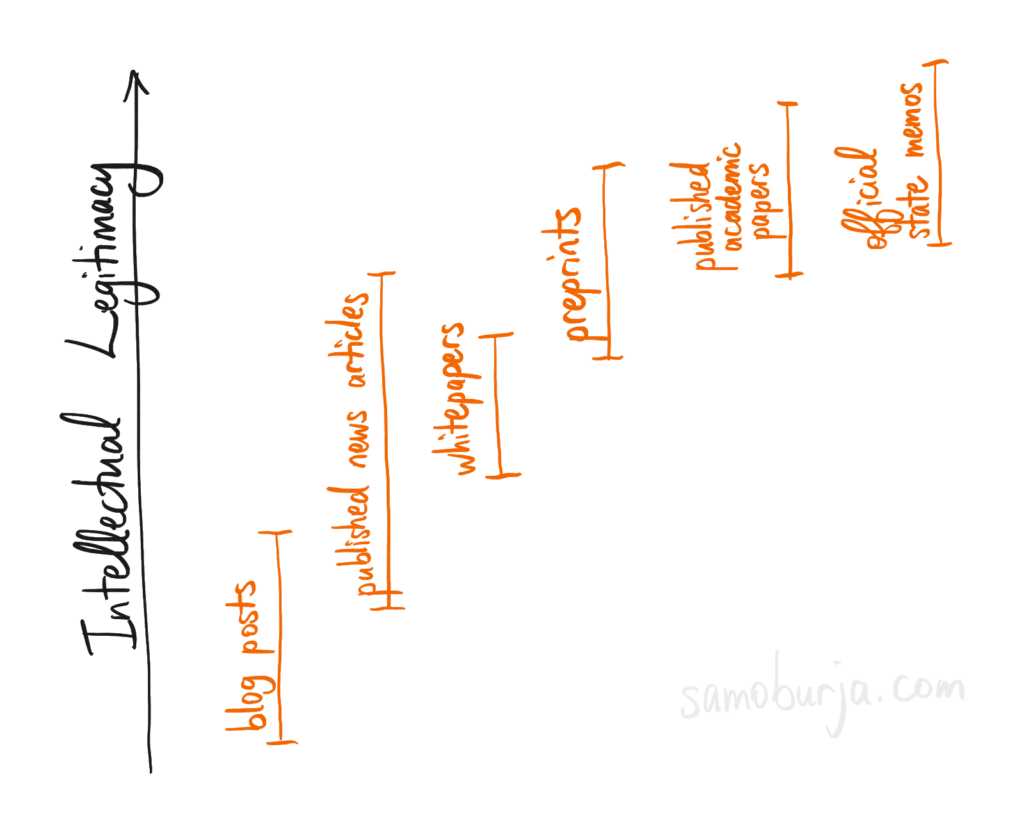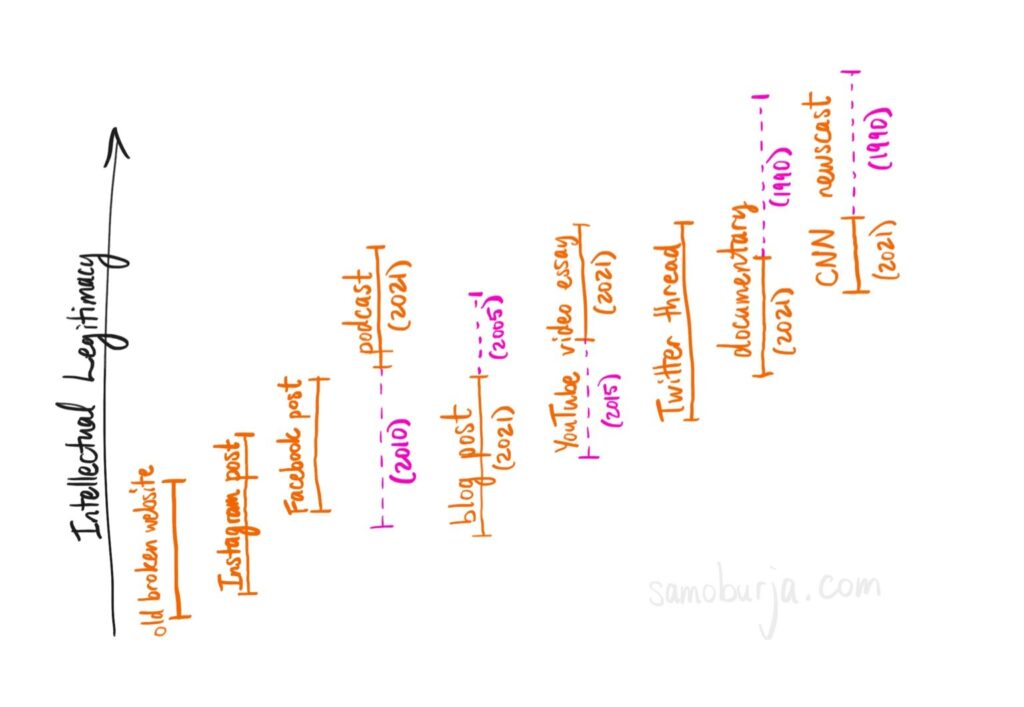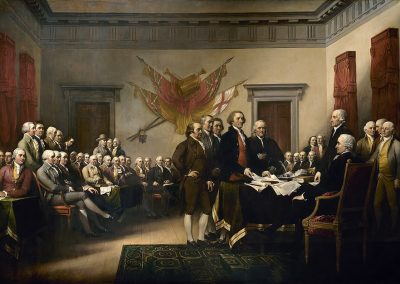
How Ideas Are Communicated
Photograph: Claudio Schwarz.
This is the third essay in my series on intellectual legitimacy. Read the first essay here. Read the second essay here.
There is a rough hierarchy of legitimacy within the many different ways that knowledge can be communicated. This hierarchy is easiest to observe in writing. In substance, a white paper is just a PDF, which in turn is just a Microsoft Word document. Yet, we know we would treat the same writing differently depending on its format. This is true even if there was very little change in the aesthetics of the document. We’ve all been trained to have emotional responses to mere format in line with what these differences mean for the use and standing of documents in organizations such as companies and universities.
Through this kind of comparison, we can draft an approximation of the hierarchy of the intellectual legitimacy of formats: an official government memo is the most legitimate, followed by academic papers, then prepublished academic papers, white papers, published articles in newspapers, and blog posts.

Figure 6. Intellectual legitimacy of some different forms of written media.
These are partially overlapping categories: a bad academic paper can be less credible than a very well-researched New York Times article, but it better be a New York Times or an Atlantic article. Furthermore, the legitimacy of different forms of media can vary by field, or as social attitudes shift over time. For example, the PDF has risen in legitimacy over time, while the legitimacy of blogs has fallen.
Beyond format, the medium of communication carries different kinds of legitimacy. Writing in general is seen as among the most legitimate media. Video, in contrast, has a profound impact on us but carries less intellectual legitimacy. An official televised statement by a head of state is one of the few exceptions. This illuminates an interesting nuance: the most intellectually legitimate form of media is not necessarily the most influential. Much of the literary and popular criticism of television in the 20th century can be summarized as the fear that the influential will outcompete the legitimate. Worries about the negative effect of television use vocabulary such as intelligence, attention span, critical thinking, and so on, but fundamentally such worries reflect a literate class—a class which, despite criticism, sees itself and is seen as legitimate—losing out to actors, studios, directors and demagogues.
The advent of the internet since the 1990s has also led to a shake-up in what media are considered more or less legitimate. For example, compared to 1990, print and television news are arguably considered less legitimate in 2021. This is not to say print or television news are illegitimate on an absolute scale, but rather that they have suffered a notable relative decline since their near-monopoly status prior to the internet. This is also reflected in how legacy print and television news outlets have largely moved their primary media of communication from print and television to online articles or video clips.
Different types of media on the internet itself also have different amounts of legitimacy that change over time. An old broken website is considered much less legitimate than a graphically well-designed site with up-to-date links. A Twitter thread is broadly considered more intellectually legitimate than a post on Facebook or Instagram. YouTube used to be a site for short, silly videos, but now hosts many hours-long video essays with relatively serious production quality on all sorts of topics, blurring the line between a YouTube video and a traditionally highly legitimate medium like a documentary. Podcasts have been slowly gaining legitimacy for a long time and have long since eclipsed radio broadcasts as an intellectually legitimate medium.
The most notable example is perhaps Wikipedia, which went from being a prime example of “You can’t trust everything you read on the internet” used by schoolteachers and academics, to being the de facto official reference for almost any topic, with the rancorous editorial debates over the “official Wikipedia line” to match its increased legitimacy.
There is nothing inevitable about how technology is received by society, however. When science fiction writers of the 1980s imagined the future of the internet, the embryonic internet they knew had highly technically sophisticated and sometimes quirky users. These mere users seemed at least potentially more credible than card-carrying journalists, who, while still respected, had already declined in legitimacy somewhat compared to the glory days of Seymour Hersh, Hunter S. Thompson, Bob Woodward, and Carl Bernstein. The intellectual authority of online writers seemed to be upwardly constrained only by the quality of their prose and ideas. Why couldn’t a pseudonymously authored internet essay be as influential as the pseudonymous Federalist Papers?
Since 2000, publications saw the rise of blogging first with amusement and then with concern. More and more ink was spilled with the intention to delegitimize the competition. Simultaneously, many of the most prominent and earliest bloggers of the era such as Justin Hall, Ana Marie Cox, and Glenn Greenwald went on to become professional writers at various organizations, over time becoming indistinguishable from journalists. In this sense, the new format was successfully constrained by the masters of the old. Although journalism today is much more similar to blogging than to the print newspapers of old in terms of medium, the format of a personal, independent, self-hosted, or even pseudonymous blog did not ever gain the legitimacy hoped for by its earliest proponents. Journalism is mainly digital now, but the format—publication, byline, editors, journalistic values and standards, etc.—has remained the same.

Figure 7. Intellectual legitimacy of some different communication media. Writing is contrasted with some examples of images, video, and audio.
What happens when the most influential format or medium is decoupled from the most intellectually legitimate one? The result is similar to the Matthew Effect for individuals or Stigler’s Tax for institutions: misattribution of credit. Part of what persuaded me of this were discussions in 2010s San Francisco. It was common to stumble upon conversations about mathematics, history, epistemology or macroeconomics at parties. The city was enlivened by the massive cognitive surplus that is best described as an intellectual golden age, since in that time technical intelligence was easily transformed into harder currency. No organization could keep a healthy mind occupied fully without ruining it, however. As a result, that spare intelligence fueled the most productive kind of dilettantism, and discussion was flourishing over dinners and in coffee shops.
In this best kind of environment, interesting books were a frequent topic of discussion. Through the course of conversation it often came to light that the interlocutor had listened to the author on a podcast rather than read the book! Podcasts were more influential than books, but books were higher in intellectual authority, so insights and information were misattributed to the book without a second thought.
Intellectual Arbitrage
Format or medium, however, doesn’t always dominate. Personal intellectual authority can outshine it. I would often hear Scott Alexander, who wrote the blog Slate Star Codex, credited with ideas, theories, concepts, and conclusions that in his writing he very clearly credits to the authors of the books and essays he was reviewing! Yet few remember him as the distiller of books. Scott can be as fastidious as he wishes about credit, yet he won’t be able to undo such misattribution. People will follow their own perception of intellectual authority.
You can work to alter perceptions of intellectual legitimacy and authority directly, bringing them slowly in line with the shifting reality of knowledge production. I was motivated to write on the YouTube revolution in knowledge transfer so I could raise the format and medium’s intellectual legitimacy. I wanted it to be accurately credited with transferring the kind of knowledge that writing was always unsuitable for. Before the piece was published, editors and friends suggested I change the title to reference video rather than YouTube, as that would help people think about my models more deeply. They were well intentioned, but their advice missed the point of writing the piece. After it was published they shared it on social media with enthusiastic commentary of how they had learned to code, dance, cook, and make furniture from YouTube videos.
Intellectual landscapes are often changed by such intervention by either individuals or institutions. We can call it intellectual arbitrage. Arbitrage refers to people making a profit by buying a good in a market where it is cheap and selling in a market where it is expensive, over time bringing the two markets to equilibrium. With intellectual arbitrage, there aren’t any markets or prices. The discrepancy is between the influence or truth of information and the information’s perceived legitimacy. Anyone who can find ways to render legitimate the information which is already influential or true gains intellectual authority in the process, as such thinkers and institutions will be invoked to justify the intellectual legitimacy of those ideas. Intellectual arbitrage is a better term than the misnomer “popularization”.
The reason for this is that the very best “popularizers” are those who bring obscure and illegible thought from either the productive corners of academia or the social fringes, into language and formats that can be used in government or public discourse. Often those billed as “popularizers” are capitalizing on ideas that are already objectively popular! Just not yet legitimate.
Forgetfulness and Invariance
So we see landscapes of authority and legitimacy can be changed through description. This generalizes to any description of social technology. There are only a few social technologies with the interesting feature of being invariant under description. As the reader of my previous essays in this series can surmise, such change can only be caused by individuals with sufficient intellectual authority.
The most influential cultural views are the ones that simply see themselves as obvious reality. Description from a position of intellectual authority can reveal hidden flaws in the claimed correspondence between social consensus and reality. It is then unsurprising that when examining professions that claim intellectual authority, we find insiders often have unspoken taboos on making explicit descriptions of their actual method, rather than their claimed method. When the actual method no longer is (or never was!) intellectually productive, this leads to stagnation. Contemporary medicine, law, and academia unfortunately make for excellent examples.
The few authoritative descriptions of such fields are met with mild interest and then quickly forgotten by professional readers. In this way, a stack of social technologies can maintain itself, not through invariance, but rather through well practiced amnesia. A natural comparison can be made to the observation of Nobel Prize winning physicist Murray Gell-Mann on the intellectual legitimacy of newspapers. The scientist noted that when opening a newspaper to an article on physics, a topic he unsurprisingly knew very well, Murray could see the journalist had no understanding of the topic, often getting the details so wrong as to reversing cause and effect! Yet, after reading with exasperation and amusement the multiple clear errors, he then turned the page to national or international affairs, and read as if the rest of the newspaper could be trusted to be more accurate. The writer and filmmaker Michael Crichton who made similar observations when reading reporting on his profession dubbed this effect Gell-Mann Amnesia after the physicist: “You turn the page, and forget what you know.”
The American social reformer Upton Sinclair describes the origin of such forgetfulness quite well: “it is difficult to get a man to understand something when his salary depends on his not understanding it.” For other readers, however rare, there remains hope. The hierarchy of a different format’s intellectual legitimacy is usually left implicit. When they are made explicit, the distinctions between formats lose some of their power over us, just as knowing and understanding Gell-Mann Amnesia does much to disenchant the objective voice of organizations whose intellectual authority far outstrips the actual epistemic capabilities.
A written description of how writing affects us is possibly a particularly promising way to inch towards truth. When reading, we’re already open to explicit interpretations of the information presented. Applying such a state of mind to how information is presented erodes the seemingly inevitable associations each text format has on us. Perhaps one can teach an old professor to read new tweets after all.
Outside of writing we are much less open to interpreting the explicit meaning of words. This is particularly true of the spoken word. A fiery speech against fiery speeches might amuse or inspire but does little to diminish their persuasiveness. This is less surprising than it might seem at first. After all, we can put into words less of what makes a speaker charismatic, since most don’t consume speech by explicitly interpreting it. We hit here on a good example of a social technology that is truly invariant to description. Another example is how we can clearly describe and even demonstrate how much more believable claims made by the taller presidential candidate are, but the unreasonable persuasiveness of tallness isn’t threatened by mere description. Perhaps precisely this security might allow us to be more honest about it. Such honesty is unfortunately much harder to achieve when it comes to the production of knowledge.
Read the next essay in this series on intellectual legitimacy here.




